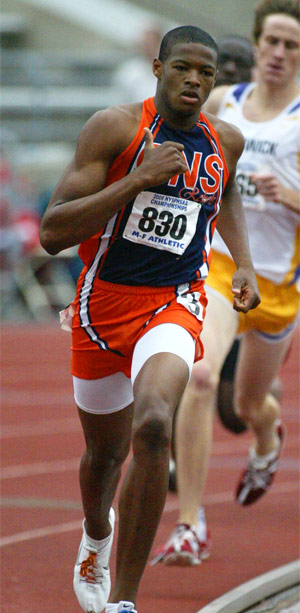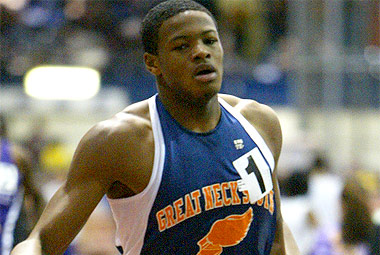 |
 |
 |
|
|
 |
 |
 |


Interval Session #91 -Terrance Livingston
By Dave Devine - January 22, 2009
Many names atop the national indoor lists are familiar to fans from seasons past. Emily Lipari has been a NY distance standout for some time. Jeremy Rankin has been a top straightaway talent for years. Wayne Davis II is a national record-holder in the hurdles. But the runner with a stranglehold on the mid-distances this winter-- US#1 in the 600, 800 and 1000-- might be less familiar. If Great Neck South NY senior Terrance Livingston was short on name recognition heading into this year's undercover campaign, he's always been long on confidence. After claiming his first New York state title (indoors or out) in the 800 at last spring's NY Federation Meet in a then-PR 1:53.01, he traveled to North Carolina and nearly won the 2-lap event at Nike Outdoor Nationals from the second of four seeded heats. His 1:50.80, run on Saturday morning, held up until the final steps of the "fast" heat four hours later, when Joe Franklin FL and Charles Jock CA crossed in 1:50.48 and 1:50.66. Livingston was awarded third, and that All-American effort propelled him into a senior year in which he has weekly been among the best at the New York Armory.
His 1:53.36 800 at the Marine Corps Holiday Classic two days after Christmas remains the national leader in that event, and last Saturday at the Molloy Stanner Games he rolled to a double win in the 600- and 1000-meter runs that left him leading those yearly lists as well. With range from 300m to 5k in cross country, a 22-foot long jump PR and 6-3 hops in the HJ, Livingston is a undoubtedly a gifted athlete on the rise. DyeStat senior editor Dave Devine catches up with him in the midst of the busy Northeast indoor circuit, before he can do any more damage to the US#1 list.
|  1) You had a great Saturday last weekend, winning the 600 and the 1000 at the Molloy Stanner Games at the Armory, both in US#1 times. Can you take us back through those races, describing the effort and emphasis you placed on both? Were you surprised to come away with the top times in the country for both events in one day? 1) You had a great Saturday last weekend, winning the 600 and the 1000 at the Molloy Stanner Games at the Armory, both in US#1 times. Can you take us back through those races, describing the effort and emphasis you placed on both? Were you surprised to come away with the top times in the country for both events in one day?
Before racing in the 1000, I told myself if I’m challenged I will try I go for at least 2:25. As video can show, I wasn’t challenged (no offense to Jordan Ashley), but I just relaxed and ran equal splits (30 seconds). It just turned out it was the #1 time in the US at that time.
But for the 600, my intention was to run fast and hope I come close to the US record. I obviously didn’t come close, but it was only because my legs weren’t feeling too hot. To tell you the truth, I was kind of scared that I would lose, because I was laboring a little and the kid in front of me didn’t seem to let up. But coming through that last turn, I told myself I didn’t come here to lose, and just blasted in front. I wasn’t too surprised that I came home with two US #1’s because, due to my talent I should have the fastest 600 and 1000 in the nation. To tell the truth, running that double and hitting those times didn’t really impress me.
2) You now have the US#1 time in the country at every distance from 600 meters to 1000 meters. Is that something you imagined you'd be able to do this season? Was it a concrete goal, or something that has just come in the flow of competing?
My major goal this season is to have two national [indoor] records (600 and 800). Having the three top times in the nation for the 600, 800 and 1000 was not a sought-out goal, but during pre-season I thought that I could have 3 US #1's, because I did run a 1:50 [last spring] and I don’t know anybody who does winter track who can run that.
3) Last spring, you went from winning your first state title in NY to making All-American in the 800 (and very nearly stealing the race from a "slower" heat) at Nike Outdoor Nationals, all within a few days. Can you talk about that progression of races, your emotions in making All-American on your birthday after waiting all day for the outcome, and what it meant for your confidence heading into this year?
During the beginning of 2008, my plan was to become an All-American and be the best 800 runner in the nation, but all season it seemed I never got in the right race. When States came around, and I won the 800 on the second day with what almost felt like ease, after a disappointing first day, I felt very confident going into Nike Outdoor.
As I said in my DyeStat video interview last spring (right, with Chris Derrick), I was just praying all day that some way, somehow, I could get an All-American honor, and in Joe Franklin’s last steps to the line I thought that I got the best gift ever—I thought I won—but it turned out he beat me by .4. I’m not gonna lie, being an All-American is great, it's just I thought I could go faster that season. And it only made me more anxious for 2009, because I felt like I would light up the track, having not peaked in 2008.
4) I know you run cross country to get ready for track, but my impression is that it's more something you know is "good for you," rather than something you really enjoy— is that pretty accurate? There was a post on the DyeStat message boards quoting you at the end of the season, saying you'd "had enough of racing on the dirt," and you were ready for track season. Can you describe how it feels when you finally get to hit the track after all those XC races, and what you feel you gain from running cross country?
I hate cross country, but it does great things
for my training. As soon as I hit the track, it took about three weeks to remember how to move my legs fast, but after that, I said to myself, “T-bunny is back (that’s my nickname, by the way).” Cross country builds up my endurance and mental strength, which prepares me for those day when I have to double up and kick butt.
5) You're a 22-foot long jumper, a 6-3 high jumper, a 48-second 400 runner...it's not exactly a given that you'd end up as one of the top middle distance runners in the country. So how did that happen? Was there a point at which you realized this might be your path, and if so, was that a reluctant realization, or have you always known your best events would be in the 400-1000 range? Do you dabble in the other events to keep things interesting (or for team points), or do you see yourself as a multi-event athlete at some point?
As a freshmen I hated the 800, but because I ran a 4:35 1500 and 52-second 400, my coach never stopped pressing me into running the ‘8,’ so I owe all my success in the 800 to him. As a young kid, I had the drive to be better than everyone in everything, so I guess I always knew I could run anything from a 200 to a 5k. I do long jump and high jump, but unless I don’t succeed in running the 800, I’ll never do a multi-event. The main reason I do multiple events is because it gives me a break from running, scores some points and is a lot easier than running.
6) Looking at your build compared to a lot of guys you end up racing against (especially in cross country) it's fair to say you're a good bit more “jacked” than the average mid-distance runner. Do you spend a lot of time in the gym, do a lot of core workouts on your own, or something in between? A lot of track athletes come to track after competing extensively in other sports first; have you always been a track guy, or were you involved in other sports before finding your strength in running?
 I think it has mostly to do with my good old Jamaican genes. If people think I’m more jacked than most middle distance runners, well thanks, I guess I am. I may be built, but I don’t spend too much time in the weight room. I spend most of my time in the gym talking trash and dancing to the latest songs. I never was too fond of track, even though I used to brag that I was faster than everyone I know. I used to play football (one of my true loves), play soccer, basketball, and I’m a real good swimmer. My sophomore year I decided to totally commit myself to track. I think it has mostly to do with my good old Jamaican genes. If people think I’m more jacked than most middle distance runners, well thanks, I guess I am. I may be built, but I don’t spend too much time in the weight room. I spend most of my time in the gym talking trash and dancing to the latest songs. I never was too fond of track, even though I used to brag that I was faster than everyone I know. I used to play football (one of my true loves), play soccer, basketball, and I’m a real good swimmer. My sophomore year I decided to totally commit myself to track.
7) Can you talk about the team atmosphere and the coaching you receive there at Great Neck South? Long Island has such a strong tradition of great track athletes over the years, and some of the best runners this season hail from the "Strong" Island. What can you share with the DyeStat readers about the pluses and minuses of living and training on Long Island?
My team is filled with the greatest kids around. All we do is play-fight, tell funny stories, challenge each other and take pictures in the cold with only our short-shorts on. On Long Island we have the best hills and courses—at least that’s the way I feel. There aren’t any bad things.
8) I couldn't find a PR for you in the mile or 1600. Is that a distance you've ever raced before? If not, is it likely we'll see the "Terrance Livingston Mile Debut" anytime soon?
I have run some mile races, but mostly just for league meets and not a fast time. If anybody can get me into a race, you may see a [serious] debut in the mile.
Photos: John Nepolitan
|
Interval Sessions Index
|
|
|
|
|
 |
 |